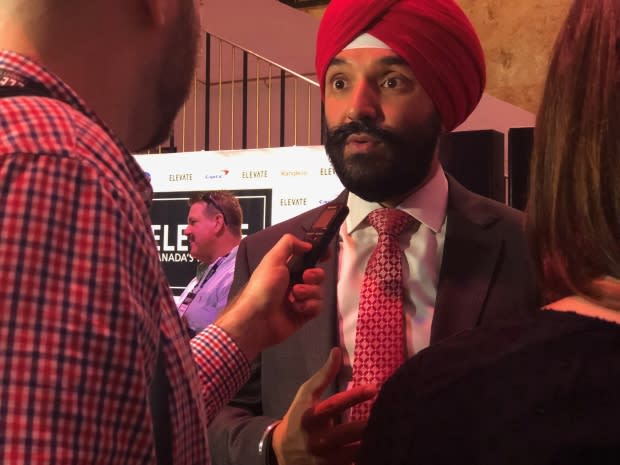Ottawa, U.S. Congress asking questions about Ticketmaster, Live Nation resales
The federal minister of innovation, science and economic development said Tuesday he is looking into revelations from a joint CBC News/Toronto Star investigation that Ticketmaster — and its parent company Live Nation — are working with large-scale scalpers to resell millions of dollars worth of tickets.
Navdeep Bains said that the government wants to make sure consumers are treated fairly, and that corporations are acting in a transparent way.
"We want to make sure that consumers are protected," he said, while attending a conference in Toronto. "And so we're going to look into this and find out what are the next steps to address this issue in a meaningful way."
Bains said, as the allegations have just been brought to his attention, it is premature to say if a formal investigation is underway.
But, he said, "we'll look into the matter, we'll look into the facts and collect all the relevant information and determine what [are] the appropriate next steps."
The report on resale practices is attracting attention on both sides of the border. Two U.S. senators are also demanding explanations about the company's secret scalper program, exposed last week.

"The allegations of the harms to consumers made in this piece are serious and deserve immediate attention," wrote senators Jerry Moran and Richard Blumenthal in a letter to Live Nation CEO Michael Rapino.
Moran, a Republican from Kansas, is chair of the Senate Commerce Subcommittee on Consumer Protection and Product Safety, and Blumenthal, of Connecticut, is the ranking Democrat on the committee.
Concertgoers around the globe reacted with anger after CBC News and the Star released hidden camera video from a scalper conference in Las Vegas in July, where Ticketmaster employees were recruiting.
Company representatives told the undercover reporters the company relies on "clients" who resell millions of dollars worth of tickets each year through Ticketmaster and that it turns a blind eye to scalpers using hundreds of Ticketmaster accounts to bypass box-office ticket-buying limits.
"Given our ongoing interest in protecting consumers from unfair and deceptive practices, we seek clarification on the use of this program," Moran and Blumenthal wrote.
Ticketmaster and Live Nation issued a statement late Monday night saying: "It's clear from the senators' letter that the CBC's reporting has left the impression that Ticketmaster provides brokers with ticket-buying software, which is categorically false. We look forward to explaining that to the senators later this week."
Seeking response by Oct. 5
The senators, who joined together in 2016 to pass "anti-bot" legislation, gave Rapino an Oct. 5 deadline to explain Ticketmaster's "professional reseller program" and its online resale system TradeDesk, which was designed specifically for professional scalpers, according to a secret Ticketmaster handbook obtained by CBC News.
The politicians posed four questions to Rapino, cited here in full:
Describe the event ticket-purchasing limits that Ticketmaster currently employs for sales on its primary ticket sales platform. Additionally, how does the company identify computer programs used to circumvent these purchasing limits?
Do Ticketmaster's ticket-purchasing limits and associated detection practices apply to users of its online program, TradeDesk? If not, please explain.
What are the specific rules and processes of compliance for participating TradeDesk users as it relates to ticket purchasing limits and other relevant consumer protection priorities? Please share any documents and guidance materials that are provided to TradeDesk users.
What role does Ticketmaster's professional reseller handbook play in deterring its resellers from engaging in illegal ticket purchasing activities?
Ticketmaster has declined to answer questions from CBC News as to why it has designed an online sales tool to help resell large inventories of tickets or why it was recruiting scalpers to its "professional reseller program" at the Las Vegas conference. Ticketmaster president Jared Smith, who has declined to be interviewed, late Monday also published a blog post to "[set] the record straight," which failed to address those questions.
"We are aware that many people don't believe we should be working with ticket brokers at all. But as long as there is a massive disconnect between supply and demand in live event tickets, there is going to be a secondary market," he wrote.
"Choosing not to participate would simply push resale back to those who care less than we do about artists and fans. The reality is, engaging brokers with a safer version of tools they could get from many other ticketing companies reduces fraud across the overall ticket market."

